By Valerie Milano
 Los Angeles, CA (The Hollywood Times) 7/19/23 – A documentary film worth seeing at Outfest is Sandra Itälien’s debut feature Coming Around (USA, 2023) – about the engagingly honest Eman Abdelhadi, who attempts to straddle the divide between being Muslim and being queer. This fairly simple documentary is especially touching for any of us who have friends who are Muslim and queer. Sandra Itäinen’s film challenges conventional “coming out” narratives as well as the false dichotomy of liberal tolerance and religious faith with its iconoclastic protagonist, Eman Abdelhadi, a queer PhD student in Sociology whose academic research on the intersection of gender and sexuality in American Muslim communities reflects her own life experience. Eman’s relationship with her own Palestinian-born mother and her understanding sister is a powerful statement about how women in the Muslim communities in the USA see themselves and attempt to balance their lives amid traditional social norms set by Islam and their own desire to be independent persons.
Los Angeles, CA (The Hollywood Times) 7/19/23 – A documentary film worth seeing at Outfest is Sandra Itälien’s debut feature Coming Around (USA, 2023) – about the engagingly honest Eman Abdelhadi, who attempts to straddle the divide between being Muslim and being queer. This fairly simple documentary is especially touching for any of us who have friends who are Muslim and queer. Sandra Itäinen’s film challenges conventional “coming out” narratives as well as the false dichotomy of liberal tolerance and religious faith with its iconoclastic protagonist, Eman Abdelhadi, a queer PhD student in Sociology whose academic research on the intersection of gender and sexuality in American Muslim communities reflects her own life experience. Eman’s relationship with her own Palestinian-born mother and her understanding sister is a powerful statement about how women in the Muslim communities in the USA see themselves and attempt to balance their lives amid traditional social norms set by Islam and their own desire to be independent persons.

It is rather heart-warming to actually meet both Eman as a 27-year-old PhD candidate living in New York City as she travels to Columbus, Missouri, to visit her mother Fatten, who is a licensed psychiatrist and has a well-paying position in health care. We don’t learn much about Fatten’s own history, but she is widowed after the death of the father of Eman and her younger sister. Fatten is used to taking care of herself and working – and obviously proud of her own academic achievements, as we see in the photograph of her graduation at a university in the United States. At the start of the film, we get an inside peak at a mother and her daughter – two very different women, both Muslim and their different understandings of how Islam should shape their lives.
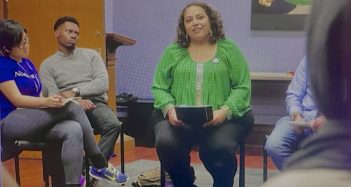
We first meet Eman at a gathering of female friends in New York City where she has written and is rehearsing in a play that will be done at the famous La Mama Theatre, a queer performance with a very long history. The Hollywood Times recently featured a piece on the queer playwright Robert Patrick, long associated with the early days of La Mama in New York City – as Robert recently passed away at age 85 in Los Angeles. Eman is a PhD candidate at a university (probably NYU or Columbia) and teaches a course on the interaction of gender and sexuality in American Muslim communities. We soon realize that her course and her academic research reflect her own life experience. We also see Eman carefully studying the Qu’ran, but her focus is an academic point of view and trying to make sense of what the holy book of Islam says she can and should be.
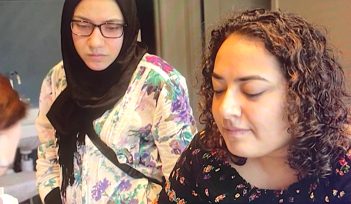
After her area of specialization is Sociology and what she has discovered is that “It’s like more liberal people who think Islam is standing in the way – of homosexual acceptance. It’s relative, which is such an annoying academic point of view.” “But I am an annoying academic after all.” In the class she is teaching, Eman starts the conversation: “I grew up in Palestine. I am not sure God exists, but I read the Qu’ran every day.” On National Coming Out Day, she brings up the topic with her students and offers her own take: “We were talking about how packaged the idea of ‘coming out’ has become in general and in pop culture. I come from a queer Muslim community. We live at this intersection that people think is not supposed to exist.”
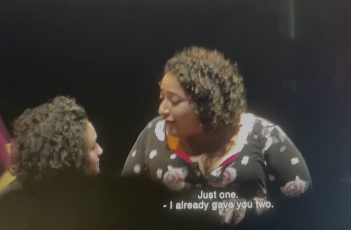
Eman and her mother Fatten have had a warm relationship, though it seems Eman painstakingly contextualizes queerness to her mother in the abstract rather than foregrounding her own sexuality. She confides often in her own sister, who is married with three young children but currently separated from her husband. This gives us a better sense of the generational differences experienced regarding Islam and lifestyle for Muslim Americans. Throughout the documentary, we see Eman driving a car on long road trips. “One of my greatest pleasures in life is empty highway. When I was a teenager and I would get into fights with Mama, I would go on these long drives.” The film is structured around reflections on events in her own life, as she drives along the highway of memory. Eman likes to drive on empty highways, she needs space for processing her thoughts.
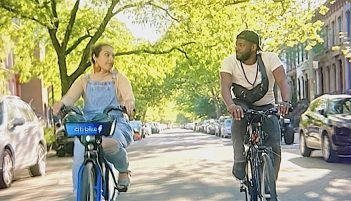
Up to this point, Eman and her mother Fatten have had a warm relationship, though it seems Eman painstakingly contextualizes queerness to her mother in the abstract rather than foregrounding her own sexuality. Fatten is a loving mother and obviously cares greatly about both of her daughters. After Eman has her mother attend the play in New York City, she is not sure how much her mother really understands about her own queerness and attraction to women. She wants to come out to the person she cares most: her mother, and also wants to come out to the previous versions of herself. On the other hand, her mother, a good religious traditional woman who pushes for the best for her daughter, says homosexuality, Islamically, it’s not right, and acting on it´s not right either.

The balance of this détente threatens to collapse when Eman’s relationship with a cis man becomes more serious and she feels internal and external pressure to have an Islamic wedding before they move in together. She meets a charming young African American man who is also Muslim, and they hit it off together with great romantic interest. Of course, this pleases her mother Fatten, who believes in heterosexual marriage at the key to a happy life. What happens in the rest of film is worth seeing for yourself. Fatten does not approve of feminism, although she is self-supporting and even wants three women to be on the board at her own mosque. From Eman’s point of view, this is a kind of feminism, and it is interesting how they “agree to disagree.” Her mother replies: “I raised you as a free spirit. And I know that your life is going to be different from mine.”
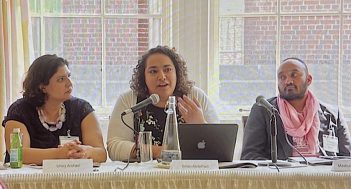
Complains Eman Abdelhadi: “My mother is starting to see me as an outsider. It’s a threat that Muslim communities have that pushes them towards a certain consistency in ideology. It seems that dilemma of how to be in a Muslim community and critique it when the whole world is waiting to judge it. I think that is at the heart of our struggle to be queer Muslims in the US.” The film dances along the edge of a dilemma: Will a heterosexual marriage undo all of Eman’s hard work in making Fatten see her queerness or is it actually an authentic expression of her fluidity?
I recommend seeing Sandra Itäinen’s film Coming Around, which will screen at Outfest on Saturday, July 22, 7:30 at the Directors Guild of America, Theatre 2. It will also be available for online viewing for a week beginning July 24 through July 30. For tickets to either option, go to: https://www.outfestla.org/films-events.




